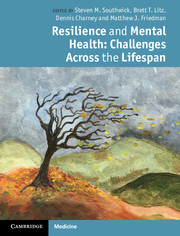Book contents
- Frontmatter
- Contents
- Contributors
- Preface
- Section 1 Pathways to resilience
- Section 2 Resilience across the lifespan
- Section 3 Resilience in families, communities, and societies
- Section 4 Specific challenges
- 13 Loss and grief: the role of individual differences
- 14 Reorienting resilience: adapting resilience for post-disaster research
- 15 Rape and other sexual assault
- 16 The stress continuum model: a military organizational approach to resilience and recovery
- 17 Resilience in the face of terrorism: linking resource investment with engagement
- 18 Resilience in the context of poverty
- 19 Resiliency in individuals with serious mental illness
- Section 5 Training for resilience
- Index
- References
17 - Resilience in the face of terrorism: linking resource investment with engagement
from Section 4 - Specific challenges
Published online by Cambridge University Press: 07 September 2011
- Frontmatter
- Contents
- Contributors
- Preface
- Section 1 Pathways to resilience
- Section 2 Resilience across the lifespan
- Section 3 Resilience in families, communities, and societies
- Section 4 Specific challenges
- 13 Loss and grief: the role of individual differences
- 14 Reorienting resilience: adapting resilience for post-disaster research
- 15 Rape and other sexual assault
- 16 The stress continuum model: a military organizational approach to resilience and recovery
- 17 Resilience in the face of terrorism: linking resource investment with engagement
- 18 Resilience in the context of poverty
- 19 Resiliency in individuals with serious mental illness
- Section 5 Training for resilience
- Index
- References
Summary
Introduction
Since the terrorist attacks in Washington and New York on September 11, 2001 (9/11), there have been a flurry of studies on the impact of terrorism and war. Not surprisingly, research has focused on the negative health and mental health impact of these events. In particular, research has focused on how direct and indirect exposure to terrorism and war relate to increased post-traumatic stress disorder (PTSD) and depression (Galea et al., 2002; Bleich et al., 2003; Panamaki et al., 2005; Hobfoll et al., 2006a, 2006b; Agronick et al., 2007). The major goal of terrorism in particular, and in many senses the purpose of war, is to impact the enemy’s civilian population psychologically to motivate them to capitulate to demands, or to make them psychologically suffer for perceived wrongs they have done. Indeed, this second goal of terrorism, to inflict harm without a clear political goal, is increasingly the stance taken by terrorists. Whether it is Hamas, Hezbollah, Al Qa’ida or the Tamil Tigers, it is not always clear what they are actually asking for, or if there is agreement among them as to what “victory” would even look like. Rather, they often strike out to cause the “enemy” to suffer in exchange for their suffering.
The study of traumatic psychological injury has continued value. In particular, we know little about how people react to ongoing terrorism (Bleich et al., 2003; Hobfoll et al., 2006a), circumstances where populations must quickly evacuate (Palmieri et al., 2008), or to different kinds of attack (shootings, stabbings, bioterrorism, etc.). Nor do we know much about instances where attacks are of large scale, even though in places like Iraq terrorist attacks have often been of major, repeated scale. Studies of national samples in regions of ongoing terrorism and war are particularly important to study because both direct and indirect exposure takes a heavy toll on such populations (Stein et al., 2004; Somer et al., 2005; Shalev et al., 2006).
- Type
- Chapter
- Information
- Resilience and Mental HealthChallenges Across the Lifespan, pp. 253 - 263Publisher: Cambridge University PressPrint publication year: 2011
References
- 11
- Cited by



